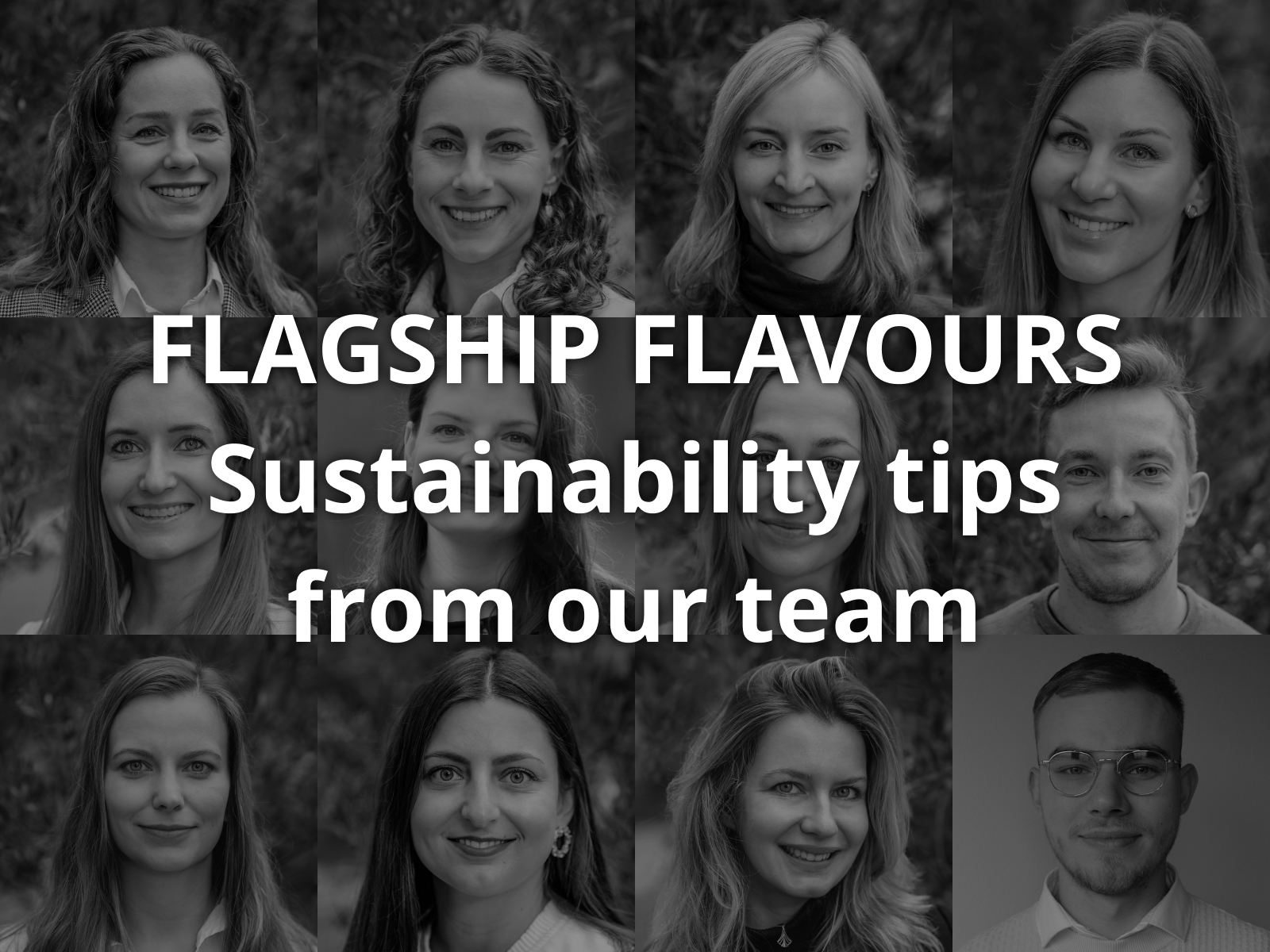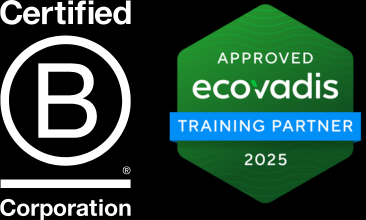The experts on our team regularly bring you a selection of recommendations and insights related to environmental and social responsibility. Whether it's an enticing book, an intriguing article, a project supporting a great cause or a helpful tool, we'll share our thoughts on why this particular piece spoke to us and why we think this particular topic is important.
Let us know what you think about our recommendations and insights, or whether you’d like to share some of your own tips with us - we’d love to hear from you.
The educational documentary series Po nás potopa nebude, currently available on Czech Television, left a strong impression on me. In the context of increasingly frequent droughts, I would particularly recommend the episode focused on water management. It offers not only a comprehensive look at the issue from the perspective of both rural and urban landscapes, but also practical inspiration for what each of us can do at home. If you have a garden, one of the most effective measures is to install rainwater tanks and use collected water for irrigation. Replacing lawn areas with shrubs and trees can also make a big difference – they retain water better, create shade, support a pleasant microclimate, and attract pollinators. On hot days, don’t forget to leave out a bowl of fresh water for garden wildlife. Major challenges and opportunities in water management, however, lie especially with companies and municipalities. They should focus on efficient use of rainwater and the development of so-called blue-green infrastructure to enhance resilience to climate change.

Do you know the "Let’s Clean Up the Czech Republic" initiative? It’s a large volunteer event that takes place in the spring and autumn, during which people clean up the countryside all over the country. This year's spring event took place in March, but unfortunately, that doesn’t mean there’s nothing left to clean up in nature.
On the initiative’s website, you can register as a cleanup organizer and take a moment to clear away the trash you encounter on your favorite walk. Or you can join one of the upcoming cleanups as a volunteer – you can choose the date and location on a map.
And if you're not a fan of organized events, do it like I do and carry an extra bag or trash sack with you. Here in our village and in the surrounding forests, I pick up litter on a daily basis. Sometimes I miss something, and my two-year-old daughter points it out to me: "Mommy, there’s some more trash."
Anyway, I’d really like to know – with all the awareness campaigns going on, who still throws garbage on the ground these days? And why do they do it? So many questions...

Have you ever thought about how much it actually costs to produce the clothes you wear? And I don’t mean fast fashion pieces from Shein or Temu, but high-quality garments made in the Czech Republic or within the EU.
After returning to sewing after a longer break, I was once again reminded how expensive clothing production really is. I made a simple dress – I bought a Burda magazine with a sewing pattern (150 CZK), quality cotton fabric (1,500 CZK), and added thread and buttons (90 CZK). The total cost of materials came to 1,740 CZK. Preparing the pattern and small adjustments took me two hours, and the actual sewing about six more. That’s eight hours of work. Using an average seamstress rate of 230 CZK/hour, the labor alone would cost 1,840 CZK. This brings the total production cost to over 2,500 CZK. A professional would be faster, of course, but even with half the time, the cost would still be high.
To ensure sustainable profit, fashion brands typically need to add a margin of 50–70%. This isn’t just profit – it covers marketing, e-shop operations, packaging, returned goods, taxes, and other overheads. In practice, this means that a dress costing 2,500 CZK to produce should sell for 5,000–6,000 CZK. And this is exactly why local clothing production is becoming rarer – and fast fashion remains so popular.
People often prefer to buy ten cheap items rather than one high-quality piece that can be repaired and worn for years. What about you? Do you lean towards fast fashion – maybe for financial reasons – or do you prefer investing occasionally in more expensive, better-quality garments where you know the origin and materials?
Disclaimer: I also buy clothes from stores like H&M or ZARA, but I’ve never ordered from Temu or Shein.

I recently discovered the Too Good To Go app, along with the Czech alternative Nesnězeno, both of which help reduce food waste. The concept is simple: restaurants, cafés, and even supermarkets offer “magic bags” through the app, leftover but perfectly good food at a lower price. You order, pick it up, and… save food from going to waste. Every year, up to one-third of all food produced globally is thrown away, which means a huge waste of resources and roughly 8–10% of global greenhouse gas emissions. Food waste isn't just an ethical and economic issue, it’s an environmental one, too. From my own experience, these apps benefit everyone. You get tasty food for less, businesses reduce their losses and attract new customers, and overall food waste gets a little smaller. I’ve already tried several places, discovered new cafés and revisited some of my regular spots. Each saved meal is a small step towards greater sustainability. And the surprise of what you’ll find in your bag? That’s half the fun. Will you give it a try too?

Do you also often listen to random podcasts on your way to work? I was recently fascinated by an interview with arborist Lubor Křížek on Lucie Výborná's podcast Guest. Lubor does some really amazing work - for example, restoring water in the landscape or attracting birds to places they wouldn't otherwise be by literally building nests for them. Do you know anyone else who builds real bird nests? These are projects that have a real impact. Not a theoretical one, but one that is seen, felt and heard. Be inspired yourself and listen to Lubor's talk when you have a free moment.

I recently discovered a new podcast focused on sustainability, titled "Zdroje tu jsou" ("The Resources Are Here"). The podcast offers a deeper insight into the topic and is more suited to listeners who are already familiar with the field. It covers a wide range of current and thought-provoking subjects such as the circular economy, innovation, social responsibility, and the core principles of ESG. Among the notable guests featured on the podcast are prominent figures such as Vladimír Špidla – former Prime Minister and EU Commissioner, Tomáš Sedláček – economist and author of Economics of Good and Evil, Soňa Klepek Jonášová – founder of the Institute of Circular Economy, and Jan Krajhanzl – founder of Institute 2050. The podcast is available on Spotify and YouTube.

In recent months, I was one of the contributors to the newly launched KlimaReady course. I authored several chapters focused on how climate change impacts business in the Czech Republic. Climate change is a topic that requires attention – especially from the perspective of adaptation. Although the changes are gradual, we are already beginning to feel their effects today, whether it’s extreme weather, water availability, or increasing demands on risk management.
Understanding these impacts is crucial not only for preventing damage but also for identifying opportunities to better prepare businesses for the future. At the same time, it's important to remember that climate change doesn’t only affect individual companies, but society as a whole – employees, customers, and the communities where businesses operate.
If we want businesses to thrive in the long term, they need a stable environment and a functioning society – and it is precisely this stability that climate change is gradually putting at risk.
The course is freely available, and I believe it can be a valuable first step toward better understanding of this complex challenge.



